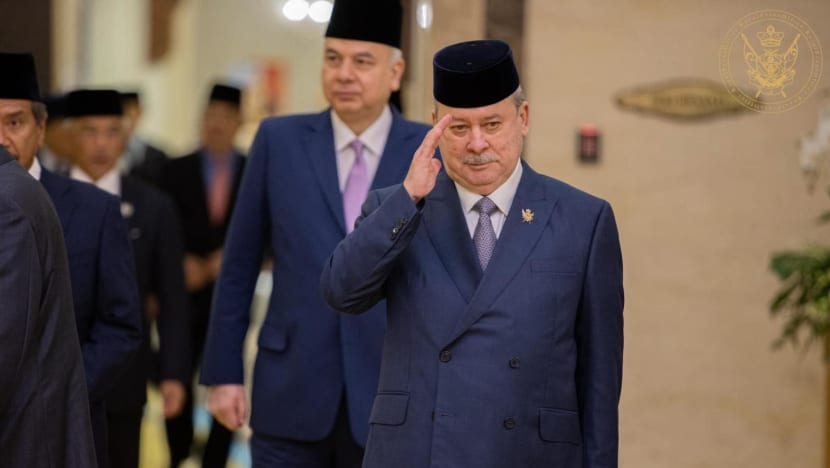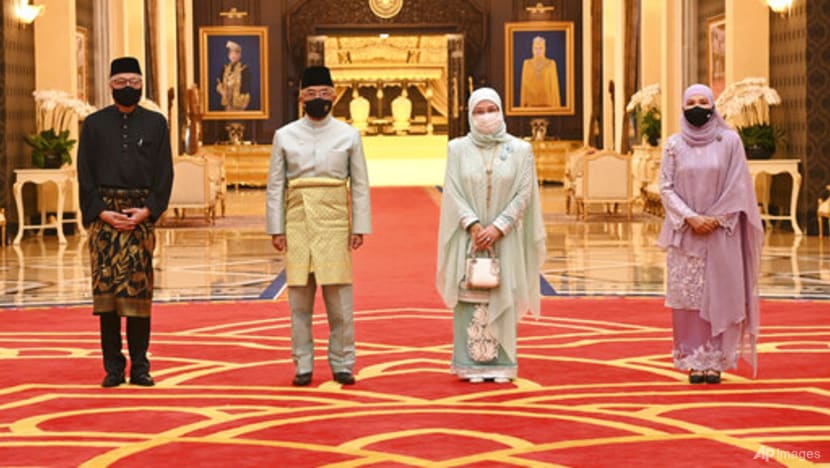Sultan Ibrahim of Johor to be appointed Malaysia’s king, 34 years after his father's reign
The decision follows the established order of Malaysia’s unique rotational monarch system in which the country’s nine rulers take turns to be the Yang di-Pertuan Agong for five-year cycles.

Johor ruler Sultan Ibrahim Sultan Iskandar at the national palace. (Photo: Facebook/Sultan Ibrahim Sultan Iskandar)

This audio is generated by an AI tool.
KUALA LUMPUR: Johor ruler Sultan Ibrahim Sultan Iskandar will be installed as Malaysia’s king from Jan 31, 2024, the first time he will be holding the post and 34 years after his father's reign.
The announcement was made in a statement issued by the Keeper of the Royal Seal Syed Danial Syed Ahmad on Friday (Oct 27) after the country’s nine sultans met at the Conference of Rulers to vote on who among them would be the next head of state, also known as Yang di-Pertuan Agong (YDPA), for the next five years.
“I hereby inform that the Conference of Rulers, during its 263rd (Special) Meeting, held at the National Palace on Friday, October 27, 2023, has agreed to declare that His Royal Highness Sultan Ibrahim, Sultan of Johor Darul Ta'zim, has been chosen as His Majesty the Yang di-Pertuan Agong XVII for a period of five years commencing from Jan 31, 2024," the statement said.
It added that Sultan of Perak, Sultan Nazrin Muizzuddin Shah, will be appointed deputy king, also for five years from the Jan 31, 2024.
The term for the current king, Pahang ruler Al-Sultan Abdullah Ri'ayatuddin Al-Mustafa Billah Shah, ends on Jan 30, 2024.
Sultan Ibrahim’s coronation ceremony is expected to be held at a later date.
The decision to select Sultan Ibrahim as the next king follows the established order of Malaysia’s unique rotational system in which the country’s nine royal households take it in turns to hold the position. The system was agreed to in 1957 when Malaya secured independence from British rule.
Sultan Ibrahim’s late father Sultan Iskandar Sultan Ismail was the last Johor ruler to be Yang di-Pertuan Agong between 1984-1989.

Malaysia’s first king was then ruler of Negeri Sembilan Tuanku Abdul Rahman Almarhum Tuanku Muhammad. His face still appears on Malaysian bank notes.
The present king Sultan Abdullah, who is Malaysia’s 16th monarch, ascended the throne in 2019 at the age of 59.
How is Malaysia’s king appointed?
- Malaysia’s YDPA is selected based on a unique rotational system between the nine rulers
- The established order since independence is Negeri Sembilan, Selangor, Perlis, Terengganu, Kedah, Kelantan, Pahang, Johor and then Perak
- The governors of Melaka, Penang, Sabah and Sarawak - the states without royal households - have no role in choosing the next king
- Although there is a rotational system, each king must still be elected to be appointed during the Conference of the Rulers
- Each sultan is given a ballot paper and asked to indicate if the first royal on the list is a suitable choice to be king
- If the first name fails to garner at least five votes, or the sultan does not want to become king, the process is repeated with the next name on the list until a ruler is chosen
- The term for each king is five years. However, the term may be shortened if the sultan abdicates for reasons like poor health, or dies while on the throne
- The king is a potent symbol of identity for Malays in the country and is the protector of Islam in states where there are no monarchs
- The king also oversees key political and judicial appointments, and serves as the Commander-in-chief of the Malaysian armed forces
- In the case of a political stalemate, the constitution gives the king the power to appoint a prime minister that he believes can command a majority among the lawmakers.
- YDPA has ultimate discretion on whether to grant royal pardons, or early release for imprisoned criminals
- The official residence for the YDPA is the Istana Negara, or national palace, in Kuala Lumpur
His predecessor Sultan Muhammad V of Kelantan abdicated after two years he ascended to the post.
Sultan Muhammad’s reign had ended in controversial fashion after some media reported that he had married Russian beauty queen Oksana Veovodina while on medical leave.
The reports, quoting unnamed sources, said that the other rulers were uncomfortable with the possible coronation of Ms Voevodina as queen.
SULTAN ABDULLAH’S “CRUCIAL ROLE” IN RESOLVING POLITICAL IMPASSE
Sultan Abdullah’s reign comes during a tumultuous time in Malaysia’s history during which the government suffered from political instability and the country had to navigate through the COVID-19 pandemic.
In Malaysia, elections usually determine who can be appointed prime minister under a parliamentary system.
During his term, Sultan Abdullah worked alongside four different prime ministers and he appointed three of them to resolve political impasses.
In the case of a political stalemate, the constitution gives the king the power to appoint a prime minister that he believes can command a majority among the lawmakers.
After the collapse of the Pakatan Harapan government in 2020 following the Sheraton Move, Sultan Abdullah took the unusual step of meeting individually with the country’s 222 lawmakers to determine who had the majority to form a new government.
The infamous Sheraton Move is a political manoeuvre led by some Parti Pribumi Bersatu Malaysia (Bersatu) and Parti Keadilan Rakyat MPs to pull support for the PH government, which triggered the resignation of then prime minister Mahathir Mohamad.

Sultan Abdullah eventually picked Bersatu chief Muhyiddin Yassin as prime minister.
Less than a year later, after Muhyiddin's government coalition fell, the king asked lawmakers to submit a letter each on who they backed as their leader and then decided to appoint United Malays National Organisation (UMNO) member Ismail Sabri Yaakob as Malaysia’s ninth prime minister.

After the 2022 General Election ended in a hung parliament where no single coalition garnered a simple majority to form a new government, Sultan Abdullah summoned the two leading candidates Pakatan Harapan chief Anwar Ibrahim and Perikatan Nasional chairman Muhyiddin for a meeting at the palace.
He subsequently confirmed that Mr Anwar would be Malaysia’s 10th prime minister, leading a unity government.
When asked to comment on Sultan Abdullah’s reign, constitutional lawyer Lim Wei Jiet told CNA: “The current YDPA faced very challenging and unenviable tasks during his reign, arguably more so than any other YDPAs since independence.”
Mr Lim, who owns his own legal firm LWJ Advocates and Solicitors, cited how Sultan Abdullah played a “crucial role” to persuade political parties to form a unity government after the 2022 federal polls.
“Arguably, (this has garnered) some success, as evident from Anwar's Government which has survived till this day. This is important for the economy and investor confidence in the long run,” he added.
During his royal address in parliament in February, Sultan Abdullah stressed that he did not intend to interfere with the country's political affairs but had no choice to avoid a crisis.
"The political crisis that happened (across) almost four years could have been prevented if the MPs and politicians in the country were able to set aside their differences and unite solely on the basis of protecting the country and its people's interest,” he said.
Political analyst Dr Azmi Hassan of the Nusantara Academy for Strategic Research told CNA that Sultan Abdullah has set a “very high benchmark” for his successors on how the YDPA may be called upon to oversee political crises.
“I would say that it's very rare (in Malaysia’s history) that the king has needed to step in to make such huge decisions. This has been one of the most challenging (YDPA) terms and I think people will remember how he helped the country through such a difficult time,” he added.
However, Dr Azmi stressed that what Malaysians associate him most with is his humility and down-to-earth personality.
“He enjoys speaking and engaging with ordinary Malaysians,” he added.
Political analyst James Chin, who is a Professor of Asian Studies at the University of Tasmania, concurred that beyond Sultan Abdullah’s contributions politically, the Pahang ruler is a “very popular king” due to his humble demeanour.
Prof Chin cited there have been social media clips of Sultan Abdullah and the queen Tunku Azizah Aminah Maimunah Iskandariah engaging with village folks whenever they travel across the country, assisting traffic accident victims they encounter as well as offering food for journalists on duty during coverage events outside the grounds of the national palace in Kuala Lumpur.
“From what the people have seen of him on social media, it projects this image that he is the king of the people,” said Prof Chin.
Meanwhile, Sultan Abdullah’s successor Sultan Ibrahim has expressed his readiness to fulfil his national duty.
Speaking to Bernama in an interview in September, Sultan Ibrahim said: “It is not a promotion. It is a responsibility I am prepared to undertake on behalf of my brother rulers.”












.png?itok=cOcJN1sK)





